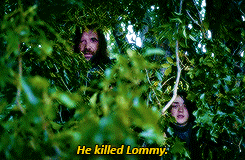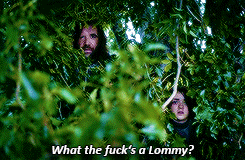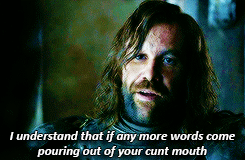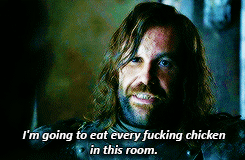Read the next entry in this series here.
4.1 “Two Swords”
Written by David
Benioff & D.B. Weiss
Directed by D.B.
Weiss
Commentary by David
Benioff, D.B. Weiss, and Pedro Pascal (Oberyn)
As with many season premiers, this one focuses on the
leftover bits of fallout from the end of last season and sets up the major arcs
for this season. It begins with one of the rare cold-opens, which shows Tywin
having Ice reforged into the swords that will eventually be called Oathkeeper
and Widow’s Wail. The reforging technique is horrendous, and Benioff and Weiss
admit they know this isn’t how swords are made, but “it looks cool.” That
pretty much sums up the remainder of the series (so far); it’s not accurate, it
makes no sense, it’s often offensive, but it looks cool.
This episode focuses quite a bit on how Jaime has changed
during his time in the Riverlands. He has encounters with three members of his
family; each encounter shows how he’s grown a bit more self-confident (despite
his injury), a bit more willing to stand up to people. He started out the
series as, frankly, a coward—the thing he was most known for was stabbing a
king in the back, after all, and trying to kill a child to cover up his indiscretions
isn’t exactly a brave thing to do. Now he stands up to his father, refusing to
leave the Kingsguard and become heir to Casterly Rock again. Tywin is deeply
displeased, of course. The fun thing about having an actor of the caliber of
Charles Dance playing Tywin is that even though he’s a terrible person, you can
kind of feel for him. He’s trying to establish the family so that its greatness
and power continues past his own life, and his kids are not cooperating. The frustration that Tywin feels because of their
stubbornness comes through much better with a neutral third-person observer
(the camera) than it does with the tight third-person viewpoint of the books,
since we never get inside Tywin’s head and Cersei, Tyrion, and Jaime each
project their own internal conflicts onto their relationships with Tywin.
Jaime then tries to rekindle his relationship with Cersei,
only to discover that she’s changed, as well. He’s frustrated because, as he
points out, everything he did out
there was for the sole purpose of getting back to Cersei. He lost a hand, for the gods’ sake. And now here
she is—drunk, apparently has some kind of infection that I think we’re supposed
to think is an STD?, and refusing to so much as kiss him.
Then he gets to talk to Joffrey, who he hasn’t shared a
whole lot of screen time with up to this point. Jaime lays out his plan for the
security at the wedding, and (as usual) Joffrey’s not terrifically interested
in the details. Instead, he leafs through the White Book, commenting on all the
big-name knights whose exploits are detailed in it. He gets to Jaime’s page and
remarks that someone forgot to write down all of Jaime’s deeds. The implication
is that Jaime hasn’t had any great
deeds to write down. Jaime says there’s still time, but Joffrey (with a
combination of the brashness of youth and his own brand of assholery) says he’s
pushing forty and doesn’t have a hand, so what exactly does he think he’s going
to accomplish? Joffrey stomps out, and the look on Jaime’s face shows that he’s
realizing just how much of a little shit Joffrey really is.
A scene very similar to this one happens in the books, but
with Loras Tyrell, who’s in his Kingsguard whites at the time. Book-Loras is
Jaime at twenty—brash, full of his own prowess, romantic-minded. He’s a
wonderful fighter and essentially took a vow of celibacy when his lover died,
joining the Kingsguard both to protect his sister and as a visible sign of that
vow. Talking to Loras about the people in the book gives Jaime a moment to
consider his own legacy and what kind of person he wants to be, how he wants to
be remembered. Instead, we get “lol gays are funny” Loras, more of Joffrey
being Joffrey, and Jaime getting a slightly troubled look on his face. Not much for introspection, is show-Jaime.
Finally, Jaime has a brief meeting with Brienne, who points
out that Sansa is still in need of protection. He takes out his frustration
with his family on her a bit, asking if she’s sure she’s not related to him just like everyone else who’s been a
massive pain in his ass lately. After all, Sansa’s safe in King’s Landing and
has no family left for Jaime to send her to; Brienne’s not convinced.
This serves as a transition to the return of Dontos, who’s
become entirely a plot convenience at this point. At least the books set up
Sansa slowly learning to trust him and believing that he’s the one who’s going to rescue her. Once we know Petyr’s behind
it, it becomes obvious; Dontos isn’t nearly smart (or sober) enough to
manipulate Sansa the way he does without some prompting. But having Petyr do
most of his own dirty work rather than going through Dontos, only to throw him
in for three whole scenes to get Sansa the poisoned necklace and then get her
out to the boat, feels like really lazy writing to me. Having Sansa wear
Dontos’ necklace and then run away with him after the wedding isn’t set up or
seeded at all, and it makes Sansa look like a little idiot. (So much of what
they do with Sansa since season 2 makes her look like a little idiot and I hate
every second of it.) Also, of course they can’t just have Dontos walk right up
to her; first they have to scare her
and have her run away and get cornered, then
show that it’s “only” Dontos (as if they haven’t already established that
every man is a threat to every woman in this show). Book-Sansa goes through a
lot of terrorization and molestation; show-Sansa goes through even more.
Other wedding preparations include Tyrion waiting to greet
Oberyn Martell on the Kingsroad. And here’s yet another place where I feel
Benioff and Weiss dropped the ball (hard)
on characterization. Book-Oberyn rides into the city with Tyrion and they have
a very political conversation that establishes Oberyn as a keen political mind.
Show-Oberyn? Outrode his escort and hit the first brothel he found in King’s
Landing. When we first see him, he’s choosing which prostitute he wants to have
sex with Ellaria, while he grabs Olyvar for himself. Disturbingly, when Olyvar
protests that he’s not for hire, Oberyn says that everyone who works for Petyr
is for hire. So we’ve got two levels of sexual coercion going on here—Olyvar’s
a prostitute who’s said no already and Oberyn won’t take that no. And this is
how we’re introduced to the character. The next thing is Oberyn hearing a
couple of Lannister guardsmen singing “The Rains of Castamere” in another room,
which sends him into a fury, and he runs out to confront them, putting his
dagger through the wrist of one of them and giving the other an ultimatum.
These are the two notes that define Oberyn through the entirety of his run on
this series—he likes sex and hates Lannisters. That’s it. That’s all there is
to him. Given that this is our first introduction to an entirely new
culture—the Dornish—it smacks again of the “barbarians are all about sex and
violence” stereotype that we’ve already gotten with the Dothraki. (This only
gets worse as we get more about Dorne. Just wait.)
Meanwhile, in the north, Jon’s put on trial for his time
with the Free Folk. He has to explain why he killed Qhorin, admits to having
sex with a Free Folk woman, and tries to convince them that Mance is a much
bigger threat than they know. Janos Slynt, being Janos Slynt, decides that
Jon’s broken his vows and should be executed. Aemon says nope, no way, and
dismisses Jon; he tells Janos and Alliser that Jon’s not lying, and he knows
liars because he grew up in King’s Landing. It’s not clear how much the other
brothers know about his past and his identity; it’s a big secret (and one of
those dun dun duuuuun moments) in the
books, but lots of stuff that’s supposed to be secret in the books is common
knowledge in the show, so who knows. In hindsight, this is where the trouble
with Jon’s storyline begins. It hits all the major beats, sure, but it loses so
much nuance. A lot of it boils down to Jon being Right About the Wildlings and
everyone else being Stubborn and Stupid. Of course, in the book, there’s so
much more politics to it than that. I’m sure I’ll be breaking this down in more
detail as we move through season five.
Also in the north, Ygritte is angrily fletching. Ygritte has
turned out to be one of the more nuanced characters in the show, and Rose
Leslie does such a wonderful job with her. Outwardly, she’s furious and wants
to kill every member of the Night’s Watch, including (especially) Jon. But it’s
also clear that she’s hurting and
she’s angry at herself for trusting Jon and she feels so stupid. And she doesn’t like feeling stupid or having her heart
broken, so she channels all of that into anger and lashes out every chance she
gets. In this case, she stands up to the Magnar of Thenn, who would scare
anybody (he obviously scares Tormund).
Speaking of which, we need to talk about the Thenns. In the
books, they’re fierce warriors, tribal, one of the ones everyone admires Mance
for managing to tame long enough to join his army. In the show? Barbarian
stereotypes. They’re cannibals. Because of course they are. Because that’s lazy
shorthand for “super dangerous tribal barbarian.” This is especially
frustrating because the Thenns in the book are actually more structured than most of the rest of the Free Folk; they have
laws, lords, discipline, and honor. They consider themselves the last of the
First Men, which means they also have history and pride. They have mines and
they forge their own weapons and armor. They do not engage in ritual scarification and cannibalism. I’d be
irritated if Benioff and Weiss had made any
of the Free Folk into this stereotype, but the Thenns in particular is extra offensive. The only real “reason” I can see
for this is making sure Olly is extra traumatized to set up his betrayal of
Jon, but I have lots of problems with Olly, as well. We’ll get there.
Daenerys is still marching south toward Meereen, and Benioff
and Weiss are still reducing her to a twitterpated little girl who’s doing her
best to hide it. She breaks up a wager between Grey Worm and Daario (Mark II)
over who gets to ride with her at the head of the column. She gives Daario a
frosty reception when he tries to give her flowers under the very thin pretext
that she should know what the flora of Slavers Bay are used for. But when he
walks off, she’s clearly admiring the
view. The only part of her stuff in this episode that has any relevance to
anything not Daario is when they come across the slave children nailed up and
pointing toward Meereen, which is just as horrifying as in the books. I
understand giving Daario and Dany more time together; in the book, all of her
admiration and lust is internal for a long time, and she gives no outward sign
of it and doesn’t talk to anyone about it. On the other hand, three-quarters of
her stuff this episode is Daario-centric, and that’s a bit much. We just need
it seeded, not stuffed down our throats.
The best part of this whole episode (the best part of any episode they’re in, to be honest) is
Arya and Sandor. Arya’s still riding pillion with Sandor and wants to know when
she’s getting her own horse, because
it’s not like she has anywhere to go even if she did try to run away. Sandor
tells her the new plan is to take her to Lysa at the Eyrie. They scout out an
inn and Arya recognizes Polliver, who’s on her list. Cue the second-best line
in this scene:
Polliver still has Needle, and Sandor thinks it’s hilarious
that Arya named her sword at all, let alone “Needle.” (Third best line: “Lots
of people name their swords.” “Lots of cunts.”)
They decide to go into the inn, where Polliver tries to talk
Sandor into joining their band of raiders. Sandor just wants some ale, and some
roast chicken. As usual in one of these kinds of scenes, the innkeeper’s
daughter is being sexually harassed in the background. (That sex, rape, and
sexual harassment are used as a backdrop for so many of these scenes is super
disturbing.) Polliver tries to trade chicken for Arya; Sandor demands two
chickens. Since Polliver doesn’t know when to shut up, Sandor tells him that if
he keeps talking:
(Best line!)
So of course fighting ensues, and Arya dances around the edges of
the fight, incapacitating and killing one man, then getting Needle back from
Polliver. She stands over him and says all the stuff he said to the Night’s
Watch recruits in general and Lommy in particular; he starts to realize who she
is just as she puts Needle through his throat and watches him drown on his own
blood.
Sandor and Arya, now mounted on her own horse, ride off into
the sunset, Sandor chomping on some chicken.
Bonus: This statue of Joffrey.
RIP:
Lowell
Polliver
Next week: The Purple Wedding. Nuff said.
Stills from screencapped.net. Gifs from tumblr.com.






























